Class 7 English Poorvi Chapter 3 Three Days To See NCERT Solutions
Class 7 English Poorvi Chapter 3 Three Days To See NCERT Solutions provide students with the study material required to learn and understand the chapter Three Days To See. The chapter shares thoughts and dreams of a woman to overcome the challenges of being blind and deaf. In this chapter, the author imagines about what she would do if she could see for just three days. Her deep appreciation for the world teaches us to value our senses and live each moment to the fullest. In this post, you will find simple and accurate solutions to all the questions from the chapter to help you understand the text better and prepare for your exams.
Class 7 English Poorvi Chapter 3 Three Days To See Question Answer – PDF Download
Let us do these activities before we read (Page 28)
Ⅰ Work in pairs. Recall a visit to a place that you liked. Discuss the details of that place and write about the following:
1. Name of the place
2. The person(s) you went with
3. The things that you could:
• see • listen • smell • taste • touch and feel
Answer:
1. Shimla.
2. I went with my family.
3. See – Snow-capped Himalayan mountains, tall deodar and pine trees.
Listen – Pahari folk songs, chirping of birds.
Smell – Blooming flowers, Fragrance of pine, cedar, and deodar trees.
Taste – Fresh Himachali apples, Chana madra and siddu (local dishes).
Touch and feel – Snowflakes, cold breeze, warmth of bonfire.
Ⅱ How does this memory make you feel?
Answer:
This memory makes me feel happy and excited because I cherish the wonderful experiences and beautiful moments I had while being surrounded by nature.
Ⅲ Do you think your visit/experience would be different if you could not see or hear? Share your answers with your classmates and the teacher.
Did you know that our five senses are essential for us to experience and make sense of the world around us?
Answer:
If I couldn’t see or hear, I wouldn’t be able to enjoy the scenic beauty of the place or experience the sounds of nature.
Yes, all our five senses are essential for us to experience and make sense of the world around us. And loss of any one of them can’t be made by anything else.
Let us discuss (Page 31)
Ⅰ Work in pairs. Identify the statements that are true from the ones given below. Share your answers with the teacher.
1. The author expresses a deep longing to experience the world through the sense of hearing.
Answer:
False.
The author expresses a deep longing to experience the world through the sense of sight.
2. The author would like exploring the city only to observe how people are suffering.
Answer:
False.
The author wishes to explore the city to observe how people spend their time carrying out their daily routines.
3. The author would spend the first day seeing the people whose kind-heartedness and friendship have enriched her life.
Answer:
True.
4. The author acknowledges that even in three days, she would not be able to see everything.
Answer:
True.
5. The author feels that everyone can find the greatest joy merely by the sense of touch.
Answer:
False.
The author feels that among all the senses, the sense of sight is the most delightful.
6. The author advises those who can see to appreciate every moment as if they might lose their senses tomorrow.
Answer:
True.
7. On the third day, the author would like to observe people in their daily lives and understand their experiences.
Answer:
True.
Ⅱ Complete the table given below with what Helen Keller wanted to do on the three days if she had sight.

Answer:
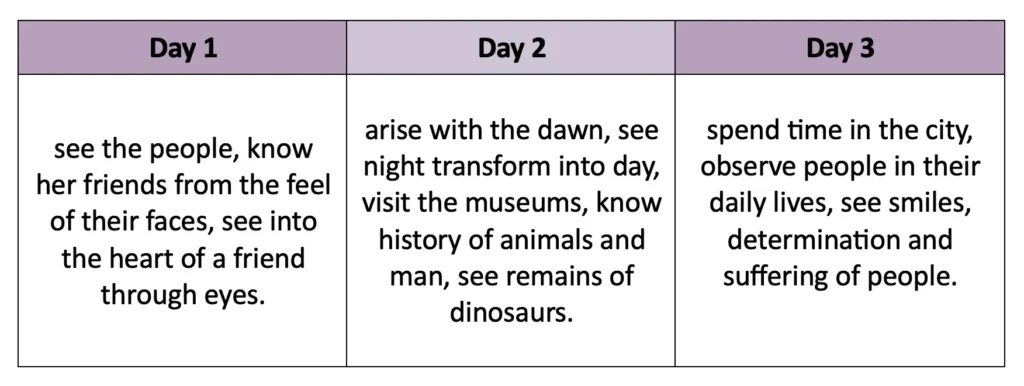
Ⅲ The author says that you need eyes to be able to ‘see’ the true self of a person. Therefore, she refers to the eye as ‘window of the soul’. How is the narrator able to understand the feelings of a person?
Answer:
The narrator is able to understand a person’s feeling by gently moving her fingertips over their face. She also uses her fingers to detect laughter, sorrow and other emotions.
Let us think and reflect (Page 32)
Ⅰ Read the extracts given below and answer the questions that follow.
1. I feel the delicate symmetry of a leaf. I pass my hands lovingly about the smooth skin of a silver birch, or the rough, shaggy bark of a pine. In spring, I touch the branches of trees hopefully in search of a bud, the first sign of awakening Nature after her winter’s sleep. Occasionally, I am very fortunate; I place my hand gently on a small tree and feel the happy quiver of a bird in full song.
(i) What does the ‘delicate symmetry of a leaf’ symbolise?
Answer:
It symbolizes the repetitive patterns found in the beauty of the nature.
(ii) List two phrases from the extract that describe the texture of objects in nature.
Answer:
1. The smooth skin of a silver birch.
2. The rough, shaggy bark of a pine.
(iii) Complete the sentence appropriately.
The phrase ‘awakening Nature after her winter’s sleep’ refers to __________________.
Answer:
It refers to the beginning of the spring season, marked by new growth and renewal in nature.
(iv) What is the tone of the writer in this extract?
A. nostalgic
B. proud
C. admiring
D. celebratory
Answer:
C. admiring
2. The next day I should arise with the dawn and see the thrilling miracle by which night is transformed into day. I should behold with awe the magnificent panorama of light with which the sun awakens the sleeping earth. This day I should devote to a hasty glimpse of the world, past and present. I should want to see the pageant of man’s progress, and so I should go to the museums.
(i) The word ‘thrilling’ has been used with ‘miracle’.
Which of the following words does not match with the word ‘thrilling’?
A. experience
B. tale
C. knowledge
D. adventure
Answer:
C. knowledge
(ii) Why does the writer refer to the earth as ‘sleeping earth’?
Answer:
The writer refers to the earth as the ‘sleeping earth’ to describe how everything in nature becomes still and quiet at night, as if the earth is resting or asleep.
(iii) Complete the sentence with an appropriate reason.
The writer wishes to dedicate the day to a brief look at the present and past world because _______________.
Answer:
Because she wants to visit museums to explore human history and progress throughout the ages.
(iv) Why does the writer use ‘should’ multiple times in the extract?
Answer:
It is a polite way to express what she would like to do if given the opportunity.
Ⅱ Answer the following questions.
1. The sense of touch makes up for the loss of sight and hearing. Explain this statement with reference to the text.
Answer:
The author uses her fingertips to feel the faces of her friends and to detect laughter, sorrow, and other emotions. She also uses her hands to feel the symmetry of leaves, search for buds on tree branches, and sense the shiver of a bird. This shows that her sense of touch helps her compensate for the loss of sight and hearing.
2. Why does the author believe that the sense of sight is the most wonderful?
Answer:
The author believes that the sense of sight is the most wonderful because it allows us to experience the beauty of the world around us. It helps us understand the expressions of people and see the colours of nature.
3. How might the author’s opinion on making the most of our senses guide us to be kinder towards people with special abilities?
Answer:
The author’s opinion on making the most of our senses guides us to be kinder towards people with special abilities by helping us understand and appreciate the challenges they face. This makes us more empathetic, respectful, and supportive towards them.
4. What is the significance of imagining the loss of a sense, according to the author?
Answer:
According to the author, imagining the loss of a sense helps us realise its importance. It makes us more aware of the value of our senses and encourages us to use them fully to enjoy the beauty of the world and experience life.
5. How does the author encourage people to approach their everyday sensory experiences?
Answer:
The author encourages people to use their senses to the fullest, as if they might lose them tomorrow, in order to truly experience the pleasure and beauty of the world.
6. What do the author’s choices for the three days tell us about her values and priorities?
Answer:
The author wants to see the people she loves, enjoy the beauty of the world, and gain knowledge by visiting museums. This reveals that she believes in making the most of life through relationships, appreciation of nature, and the pursuit of knowledge.
Let us learn (Page 34)
Ⅰ Sensory words are descriptive—they describe how we experience the world: how we see, hear, smell, taste or feel something.
Complete the following table with sensory words from the text in Column 2 for the five senses in Column 1. Add new words in Column 3.
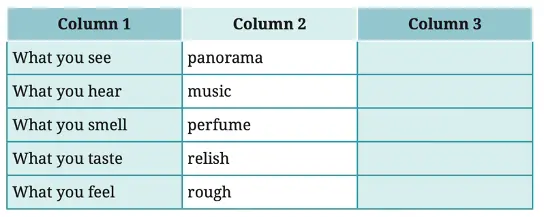
Answer:
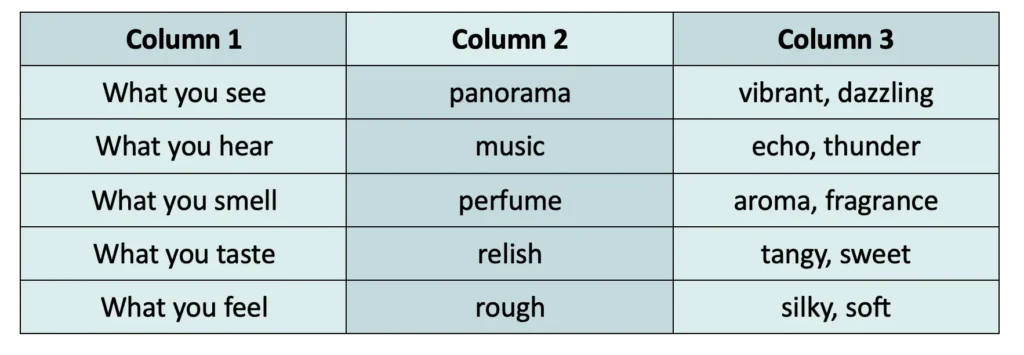
Ⅱ Read the following sentences from the text and underline the verbs.
• I should divide the period into three parts.
• On the first day, I should want to see…
• The next day I should arise with the dawn…
• I should behold with awe…
Answer:
• I should divide the period into three parts.
• On the first day, I should want to see…
• The next day I should arise with the dawn…
• I should behold with awe…
The words you have underlined are a combination of two verbs. In each of these sentences, ‘should’ is the modal verb (suggestion), and the second verb (divide, want, arise, behold) is the main verb.

Ⅲ Identify the modal verbs in the following sentences. Choose the functions they express from those given in the box below.

1. You can learn a lot from this experience.
2. They might arrive late due to traffic.
3. She must finish her homework before dinner.
4. They ought to apologise for their mistake.
5. He would like to have some lassi, please.
Answer:
1. can – ability.
2. might – possibility.
3. must – necessity.
4. ought to – moral obligation.
5. would – polite request.
IV Read the situations in Column 1 and functions in Column 2. Fill in the blanks in the sentences in Column 4 with appropriate modal verbs from Column 3. After filling in the blanks, explain the function of each modal verb you used to your classmates and the teacher.
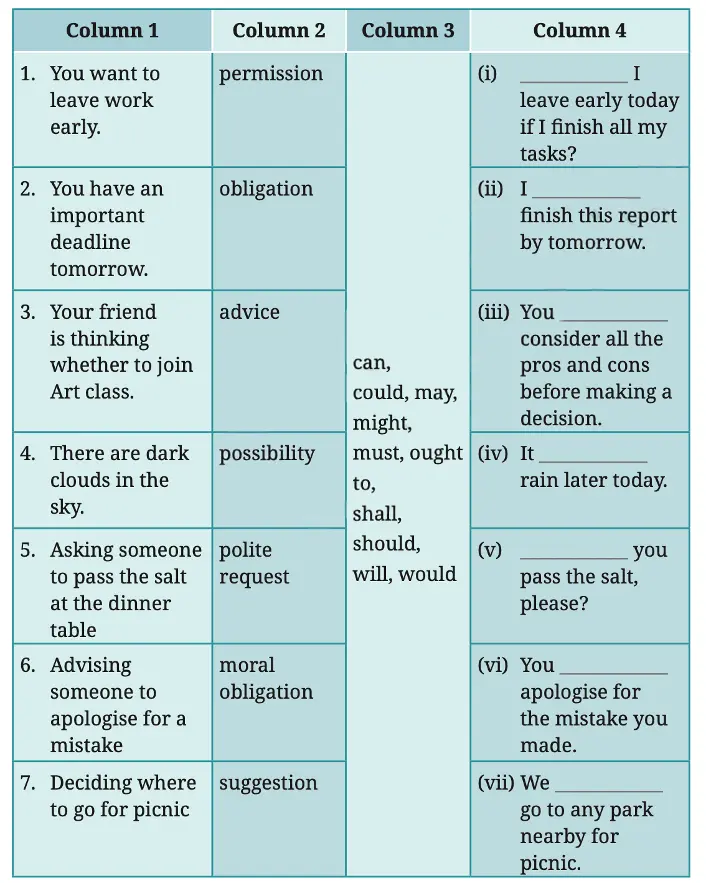
Answer:
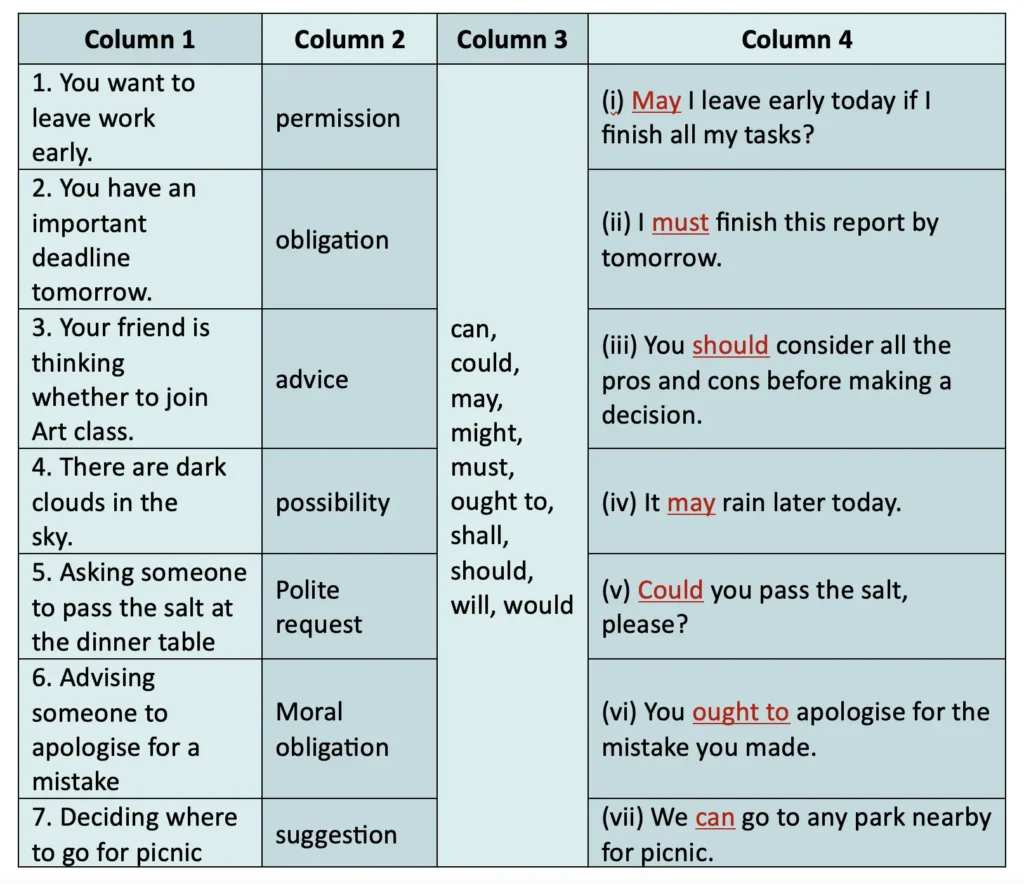
Let us listen (Page 36)
Q. You will listen to a conversation between a mother and son. As you listen, select four true statements from 1–7 given below. (Transcript for the teacher on pg. 41)
Transcript:
ANUJ: Ma, we have a new student in our class, Tara. She’s quite talkative and pleasant. You know, the writing in her books doesn’t look like ours. It’s different. She told us that it’s called Braille.
MOTHER: It’s great to know that your school has facilities to address the needs of the visually impaired. Thanks to the Digital India Initiative, which is paving the way for inclusion of the visually impaired.
ANUJ: Oh, Digital India! That’s about being computer literate, isn’t it?
MOTHER: Well, Digital India is about more than just internet access. It aims to include everyone, including people with disabilities, by providing digital infrastructure and services. For the visually impaired, it means access to assistive technologies like screen readers, voice-over- enabled smartphones and apps that can make daily activities easier.
ANUJ: Ohh... interesting. What is a screen reader, Ma?
MOTHER: I knew you’d ask about it! Well, a screen reader is a software application that helps people who are visually impaired use computers and smartphones. It reads out the text displayed on the screen and provides audio feedback.
ANUJ: That’s amazing! So, Tara can use a computer just like we do?
MOTHER: Yes, she can.
ANUJ: So, it makes a big difference in their daily lives.
MOTHER: It certainly does. It ensures that people who are visually impaired can use digital services independently, without help from others. This can improve their quality of life. It also opens up more job opportunities in fields like IT, banking, and more, where they can work just efficiently like anybody else.
ANUJ: Wow! So that means people who are visually impaired can work and do things on their own? I’m so proud of my school.
MOTHER: Yes, and this way, we can ensure that the benefits of Digital India reach everyone, helping them to participate fully in all areas of life.
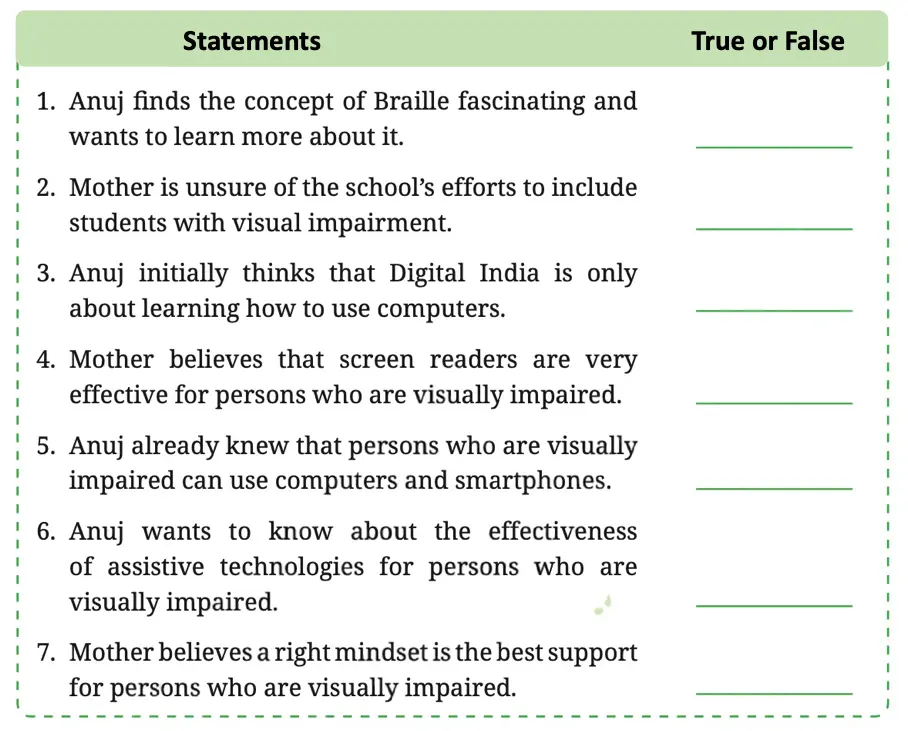
Answer:
1.Anuj finds the concept of Braille fascinating and wants to learn more about it. False
2. Mother is unsure of the school’s efforts to include students with visual impairment. False
3. Anuj initially thinks that Digital India is only about learning how to use computers. True
4. Mother believes that screen readers are very effective for persons who are visually impaired. True
5. Anuj already knew that persons who are visually impaired can use computers and smartphones. False
6. Anuj wants to know about the effectiveness of assistive technologies for persons who are visually impaired. True
7. Mother believes a right mindset is the best support for persons who are visually impaired. True
Let us speak (Page 36)
Q. Work in pairs. Take turns to speak for a minute on any one of the senses you value the most. Use the given prompts to frame your response before you speak.
• I value my sense of sight/sound/ touch/smell/taste the most because…
• One of my favourite experiences is…
• This is so because…
• I appreciate being able to see/hear/ touch / smell / taste…
• God forbid, if I were to lose the sense of sight/sound/touch/smell/taste, it would make me feel…
• I would not be able to…
• I thank God that I am able to see/ hear / touch / smell / taste.
Remember to
• speak clearly and confidently
• glance at your notes for reference rather than reading
• make eye contact
• use gestures if you wish to
• pronounce words clearly and avoid mumbling
• speak at a steady, moderate pace
Answer:
I value my sense of sight the most because it enables me to see and experience the beauty of nature. One of my favourite experience is watching the sunset and sunrise. This is so because these are the moments when the sun appears orange and is soothing to the eyes. I appreciate being able to see the magnificent colors of the nature. God forbid, if I were to lose the sense of sight, it would make me feel as if darkness has descended upon me. I wouldn’t be able to recognize or see the world around me. I thank God that I am able to see, which allows me to enjoy nature’s pleasure and beauty.
Let us write (Page 37)
Q. A descriptive paragraph describes a person, place, object or event to create a memorable experience for the reader. Write a descriptive paragraph describing a place that you visited recently.
Follow the guidelines given below to draft this paragraph.
1. In the opening line, begin with something interesting to capture the reader’s attention. Introduce the place you visited.
2. In the supporting lines, describe the place using adjectives and specific details that appealed to your five senses—sight, sound, smell, taste, and touch. You may include alliterations, similes, and personifications to hold the reader’s attention. 3. In the concluding lines, summarise the description to provide a final impression. Mention what was the most important thing about that place which others should also experience.
Answer:
Nested in the lap of the Himalayas, Shimla is a famous destination among tourists. This summer, I had the opportunity to visit the place. The moment I arrived, I was captivated by the cool mountain breeze that gently touched my face and the scent of the pine trees that filled the air. The green hills appeared as if covered in green velvet, and the distant chime of temple bells echoed through the lanes. The streets were lined with cafés offering steaming cups of tea and freshly baked butter buns that melted in my mouth. The wooden benches in the town square felt warm under the gentle sun, and every corner of Shimla seemed to whisper stories of the past. The most unforgettable part of the visit was watching the golden sun set behind the snow-capped peaks — a sight so peaceful, it seemed as if time stood still. Shimla is not just a place; it’s a feeling that lingers, and everyone should experience its magical calm at least once.
